- Home
- Matt Hilton
Blood and Ashes jh-5
Blood and Ashes jh-5 Read online
Blood and Ashes
( Joe Hunter - 5 )
Matt Hilton
Matt Hilton
Blood and Ashes
Prologue
Brook Reynolds woke up screaming without knowing why. The last few minutes were a blur; she could recall thinking of her children but why would that make her scream? She only knew that it was the right thing to do.
Then, with a jolt, it all came back: how everything had changed so horribly in a matter of minutes.
She remembered the car behind hers, barely a distraction at first. Her thoughts were fully on her husband and children. Brook smiled as she pictured their faces. Soon she’d be home and there’d be hugs all round. She’d missed them all while away on business.
The mountain roads were familiar, if twisting, and her mind was preoccupied with the impending happy reunion, so the following vehicle didn’t register with her too much. Not until it moved in close and her rear-view mirror reflected the harshness of its lights. Her pulse fluttered in her throat and her eyes stung at the glare.
‘What in God’s name are you playing at?’
The vehicle was a silhouette beyond the stark beam, and it loomed massively in her mirrors. Brook couldn’t see the occupants, but they must be reckless idiots. Didn’t they know the road took a series of sharp turns just ahead? As a gentle reminder she touched the brake pedal, hoping they’d back off. She watched the vehicle dwindle, but had to tug her eyes from the mirror when its lights were flicked up to full beam.
‘Asshole!’
She didn’t want to get into a sparring match, but she had to warn this lunatic to back off. Again she toed the brake, and her lamps turned the night red. The following vehicle speeded up, and the interior of her car was invaded by its lights. Its horn screeched.
‘What the hell are you doing?’ She shouted this time, touching the gas pedal to avoid a collision. She pushed the car into the first bend, snatching her attention from the curve ahead to the blazing lights behind, back to the road again. Then, coming out of the curve, she put her foot down. Unperturbed, the car shot by her, spitting up grit from the side of the road. Brook avoided looking at the driver: probably some crazy redneck high on something. This was the last thing she wanted. All she needed to do was get home.
The car roared on and into the next bend.
Thank God, it kept on going.
Brook didn’t slow. She kept her foot steady on the gas.
Coming round the tight bend she saw the dark form of the other car in her path. It was parked across the narrow road, lights extinguished, someone standing by its rear. The figure stepped forward, raised his hand. Oh, my God! Was that a gun? Something flashed. She let out a cry of disbelief, yanking hard on the steering wheel. It was reflex, or panic, perhaps both.
The tyres bit into the soft verge at the edge of the road, then there was nothing beneath them and the car began to roll. The forest opened its arms to greet her. The next instant was filled with showering sparks and raining glass, the shriek of tortured metal and numbing collisions as her head was repeatedly slammed and jostled. Her mind was full of darkness.
And that’s when Brook had come to, screaming.
Her body felt immensely heavy, and the pressure behind her eyes was overwhelming. She didn’t understand that she was hanging upside down, or that the pain across her throat was the seat belt cinched garrotte-tight.
She wanted nothing more than to be home. She had no time for this!
There was a stench in her nostrils and her face and hair were slick with fluid. The liquid wasn’t blood; it was more acidic than that. Like chemicals.
She stopped screaming to spit out the vile stuff, and turned her eyes to seek out the source of a new sound invading her mind. Voices, talking excitedly as they approached.
‘Help me,’ she croaked.
‘Is she dead?’
‘I don’t know.’
‘Help me,’ she said again more loudly. And she suddenly understood what she was soaked with. ‘I’m covered in gasoline. Please… somebody help me.’
‘She’s still alive,’ the first voice said.
‘Yeah,’ said the other. ‘We need to do something quick.’
Thank God, she thought, I’m going to see my children again.
Then the first one said, ‘Yeah. Take these matches. You’d better finish her off.’
Chapter 1
The clouds failed to conceal the moon. It scowled like a drunkard’s bloodshot eye over the rim of an empty glass. The disc was low on the horizon, bloated and red, and I couldn’t help aiming a derisive snort its way. A hunter’s moon: how ironic was that?
Walking slowly, my hands stuffed in my coat pockets, I felt the same breeze that made ribbons of the clouds tug at my clothing. In a baseball cap, scuffed leather coat and denims, I wandered up the centre of the main street of Bedford Well, with no care for traffic. It was after three in the morning and the only things moving were the cats with which I shared the night.
There was no one around. I hadn’t seen another soul since arriving in town and parking my Audi in the darkened lot of a Seven-Eleven. That suited me. I’d rather be here and gone before causing a blip on anyone’s radar. Should any insomniac glance out of a window I’d appear unremarkable, just another guy down on his luck with no real destination in mind, passing through on his way to an undetermined destiny. That suited me as well.
Three nights ago I’d been on the Florida Gulf Coast and it had been warm enough for shorts and a bare chest as I’d reclined on the deck that overlooked the beach. Now the leather jacket was necessary for more than concealing the gun in my belt. The wind sweeping down off the Pennsylvanian hills held a lingering nip of winter and that didn’t suit me at all.
My limp wasn’t very pronounced, not after three months of hard exercise to get back up to speed, but the cold reminded me that not too long ago I’d been both shot and stabbed in the right leg. The pain was just a dull ache and I pushed it to the back of my mind. Pain is an ally; it confirms that you’re still alive. I’d been fed bucket-loads of similar psychobabble when in the military; some of it helpful, most of it horseshit. Mostly pain hurts and it slows you down. How could that be a soldier’s friend? Made me wonder if maybe I wasn’t fit for this line of work any more, and that the accumulation of injuries picked up throughout the years was conspiring against me. Or, like my best friend Rink often joked, age was beginning to catch up with me.
Maybe there was something in that, but I wasn’t ready for the scrap heap just yet.
The limp did serve some purpose. It added to the disguise I’d affected. Studying this stubble-chinned man, holding himself tightly against the chill, looking thoroughly miserable, who’d ever guess I was here for a deadly purpose?
On the drive up I’d questioned my motives for coming to this dead-end town and more than once had almost turned the car round and headed south again. It’s a weakness, but I can’t say no. I should’ve told Don Griffiths to take a hike, concentrated on getting healthy again in the sub-tropical sun. But here I was. Apparently it’s true: you can’t teach an old dog new tricks. I’ve never learned to roll on my back and wasn’t about to now.
The main street of Bedford Well wasn’t much more than a hundred yards of family-run stores and amenities, all shut up tight for the night. At its northern end it opened into a circle of dwellings around a central green, complete with a wishing well that explained the town’s name. The well had a bucket, but no one would be able to draw water from it because a metal grille had been bolted over the top. A huge brass padlock fastened the grille to the stonework, but it was shiny and proclaimed that the well was regularly emptied of coins. The town council, it seemed, had claim on the nickels and dimes as well as peopl
e’s aspirations.
I leaned my hips against the well, dug a couple of coins from my jeans pocket and dropped them through a slot in the centre of the grille. I heard them hit bottom. They hadn’t fallen very far, making me wonder if this was just a folly designed to please the tourists. Regardless, I made a wish.
Waste of money, because my wish was already redundant.
I was already here and now there was no going back.
Testament to this was the presence of the black SUV that nosed out between two stores further along the street. Two shadows filled the front of the vehicle, topped by pale ovals that were turned my way. Under the peak of my cap, I returned their casual observation until the driver hit the gas and peeled out, heading back along the street. The brake lights flared, then the SUV took a turning to the right. The grumble of the engine carried on the air until the wind shifted and snatched it away.
What was that all about? I mentally shrugged: nothing good, I bet.
I headed across the green towards an imposing house that held sway over the smaller dwellings to either side. The house looked Victorian but for the satellite dishes in the garden and the cars on the drive, a Lexus and a Mercedes SUV. For all his claims to the contrary it looked like Don Griffiths was doing OK even in this cul-de-sac of a town.
I leaned on the doorbell.
The house remained very still. As if it held its breath.
I pressed the bell again.
Beyond the door there was a shift in the darkness and a light came on above my head. I fought the urge to glance up at the light, an old habit to protect my night vision. Waited while the person inside hooked a security chain in place, then opened the door a sliver.
Don is a heavy-built man in his early sixties. He has short steel-grey hair and a neatly trimmed beard to match. The person looking out at me didn’t match any of those points. She was slim and dark and no more than thirty years old.
It was more than fifteen years since I’d laid eyes on her but I’d have recognised Millie anywhere. She had the vivid green eyes and raven tresses of her mother, but the strong nose and high cheekbones were every inch the image of her father.
Millie Griffiths studied me for a while. I raised my head so the peak of the cap was no longer casting such a long shadow on my face. Finally Millie closed the door and I heard the unhooking of the chain. She opened the door fully this time.
‘Come in, Joe.’ Her head dipped as I stepped by her into the darkness of the entrance hall. It looked like all the rooms on the lowest floor were unlit.
‘Where’s your father?’
Millie locked the door before turning to look at me.
It was weird standing there in the dark, staring at her silhouetted against the front-door glass, all that was evident being the soft sparkle of her eyes. When she moved past me her shoulder brushed my upper arm and it was brusque. I settled my heels as Millie walked away without comment. Then, sighing, I followed.
Without flicking on a light, Millie led the way along the hall to the back of the house. There she opened a door and a flight of stairs led down into the basement. Another door at the bottom was etched around its frame with a dim glow.
I paused before descending.
Didn’t need to hear her sob to know.
‘I’m too late,’ I said. ‘I heard what happened and I’m sorry.’
Millie nodded: a single hard slash of her jaw. ‘My sister died because you wouldn’t believe him.’
She turned away before I could reply, her tread heavy, then quickening as she fled up the stairs to a bedroom. Overhead a door slammed and I listened to the young woman sobbing uncontrollably.
‘Shit…’
I pulled the cap off and jammed it into a coat pocket. Scrubbing a hand through my hair I took the stairs down to the basement, counting the steps. With each one it felt like I was descending into the abyss.
Chapter 2
‘I hear you’re supposed to be some kind of knight errant, these days.’
I shook my head. ‘That’s not the way I’d describe myself.’
Don Griffiths was sitting in an old chair with sunken upholstery and faded patches on the arms. How many hours had he spent sitting in this selfsame place over the years? How many memories could that old chair recount if it was given a voice? Over Don’s shoulder an archaic cine-camera projected some of those memories on to a makeshift screen. The flickering images were the only source of light in the otherwise dark room, two small girls playing in a paddling pool while first a younger Don and then his late wife, Sally, mugged and danced for the camera.
Don didn’t look at me. His gaze was lost among the images on the screen. ‘How would you describe yourself? I thought you were someone I could rely on. Where were you when I needed you?’
I exhaled, and turned to view the girls happily playing. Even back then, Millie was distinctive. Her slightly older sister, Brook, was pretty as well, but with the elfin qualities inherited from her mother. It was difficult coming to terms with the thought that the little girl — who was so full of life and wonder on the screen — was now dead and buried.
‘I was injured.’ Though no excuse, it was the only thing I had to offer.
‘I noticed you were a bit lame when you came down the stairs.’ Don wasn’t interested in any one else’s pain, only his own. ‘But you’ve been injured worse than that before. Wounds never stopped you then, Hunter.’
‘I was younger.’
‘Yeah,’ Don agreed. ‘We both were. But my daughter won’t grow any older, will she? Her children will never know their mother’s love again.’
There was no answer to that. I could only watch as Don shuddered, his chin dipping on his chest. The man wept silently. Laying a consoling hand on his heavy shoulder wouldn’t help. Don wouldn’t welcome my pity. Always pitiless to others, he saw emotion as weakness. Maybe it would do him good to experience some of the grief.
It was as if Don could hear what I was thinking. His head came up and he fixed his gaze on me. ‘I know you don’t owe me a damn thing. In fact, if you told me to go to hell, I guess I’d understand. But I didn’t think Joe Hunter was the type to turn his back on a woman or her children.’
‘I’m not.’ Even as I said it I realised how ineffectual my words sounded. I turned back to the screen. Millie and Brook had moved on to chasing each other around the garden with buckets of water. There was no sound accompanying the home movie, but by the rapture of their faces both girls were squealing in glee. Closing my eyes didn’t help.
The chair creaked, and there was a grunt as Don stood up. He turned off the projector and the room was plunged into darkness that was evident even behind my closed eyelids. Only at the click of a light did I turn and look at the older man. Don had both hands folded across his bulging stomach, his head dipped: he looked like a monk in prayer. But I recognised the stance for something else — it showed an old man shattered by the loss of his child.
‘Tell me again what happened, Don.’
‘What’s the point?’
‘Because I’ve travelled days to get here.’ I stopped. I didn’t care for Don one bit. Not after what had occurred between us all those years ago, but it was like the man had already said: I wasn’t one to turn my back on women or children in need. ‘Look, Don. Let’s put our differences behind us for now. Tell me what happened… maybe there’s still something I can do. If what you originally told me is true, then this may not be finished with.’
Don probably wasn’t even conscious of chewing the end of his moustache. He was too busy studying my face for a sign of insincerity. He must have come to a favourable conclusion because he slow-blinked like an old bull frog. ‘It is true. As crazy as it sounds.’
Three days on the road had left their residue on me. Perspiration had dried on my skin, my clothes were grimy and uncomfortable, but that wasn’t the reason for the prickling sensation in my flesh. It was as though my nerve endings were charged with static. ‘It just takes a little coming to terms with, Don
. How could a dead man be threatening your family?’
‘It’s gone way beyond threats, Hunter. Didn’t you hear what I told you? Brook is dead.’
The tingling in my skin was becoming painful, and a seething rush shot through my veins. I resisted the urge to scratch and bunched my fists in my pockets. ‘Brook was killed in a car crash. The police ruled it an accident.’
Don grunted. Next to his battered chair was an equally worn cabinet. He pulled open the top drawer and drew out a folder which he opened and held out. I was still thinking about the gleeful faces that had only moments before flickered on the screen and didn’t want to see what Don offered.
‘Take it,’ Don said. ‘Have a good look and tell me if you still think my daughter died accidentally.’
I’m no stranger to death in any of its horrible forms. To some I’ve inured myself, but not all. Once, I bore witness to the aftermath of an attack by guerrilla fighters on a village of innocents. Some of the victims — mostly women and children — had been burned alive. The images of their bodies twisted into blackened husks still occasionally plagued my nightmares. I didn’t want to see Brook like that.
But I looked.
The rushing heat in my veins went cold.
There were photographs from the accident scene. They showed a vehicle on its roof, so consumed by fire that even the tyres had been burned clean off their rims. The distance shots weren’t so bad; only when the camera had zoomed into the interior did it became apparent that the bundled form lying amid the ashes and molten components had once been human. That was nasty. But nowhere near as horrific as the follow-up photographs from the morgue where Brook’s remains had been taken. Under the stark glare of lights, surrounded by dull steel, the extreme charring of the woman’s corpse was shocking. There was little left of her, just a blackened skull and the withered husk of a torso. The larger bones of the upper arms, the pelvic girdle and legs had survived, but all the lesser bones of her extremities had gone to ash. She had been twisted by the intensity of the heat into the classic pugilist pose, but it wasn’t that evident with her hands gone.

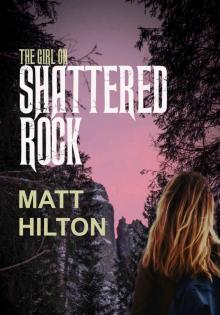 The Girl on Shattered Rock: A gripping suspense thriller
The Girl on Shattered Rock: A gripping suspense thriller Collision Course
Collision Course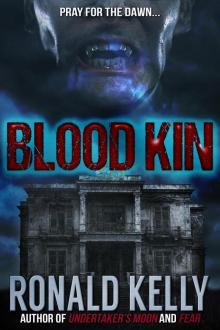 Blood Kin
Blood Kin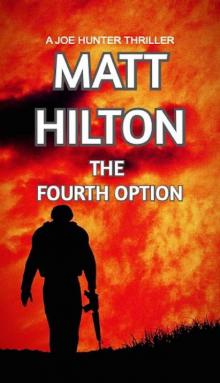 The Fourth Option
The Fourth Option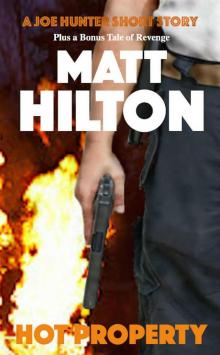 Hot Property: A Joe Hunter Short Story
Hot Property: A Joe Hunter Short Story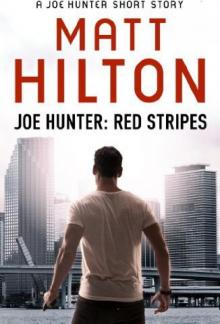 Red Stripes
Red Stripes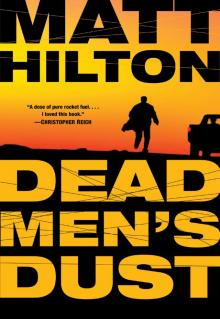 Dead Men's Dust
Dead Men's Dust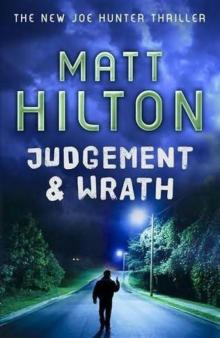 Judgement and Wrath
Judgement and Wrath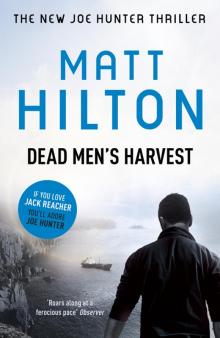 Dead Men's Harvest
Dead Men's Harvest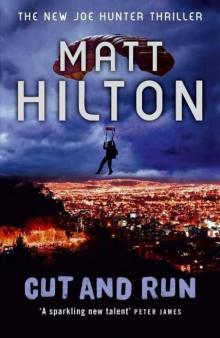 Cut and run jh-4
Cut and run jh-4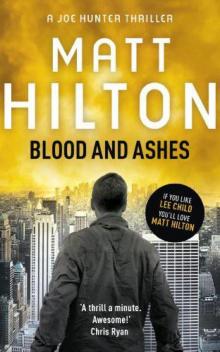 Blood and Ashes jh-5
Blood and Ashes jh-5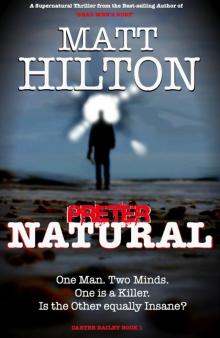 Preternatural: Carter Bailey Book 1
Preternatural: Carter Bailey Book 1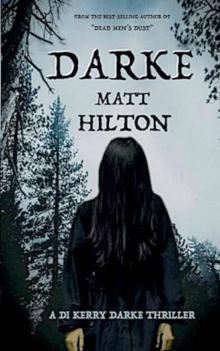 Darke
Darke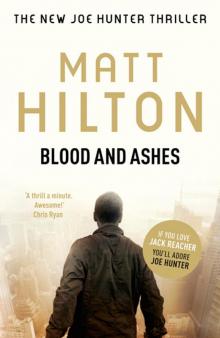 Blood and Ashes
Blood and Ashes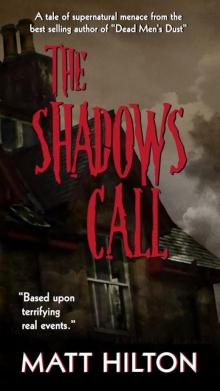 The Shadows Call
The Shadows Call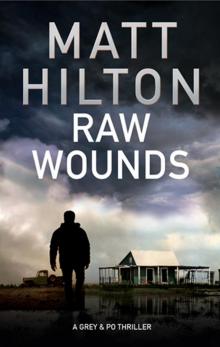 Raw Wounds
Raw Wounds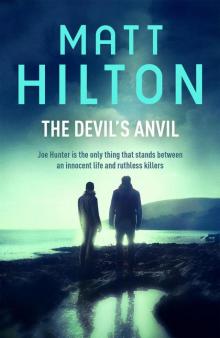 The Devil's Anvil
The Devil's Anvil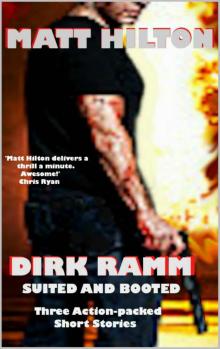 Dirk Ramm: Suited and Booted
Dirk Ramm: Suited and Booted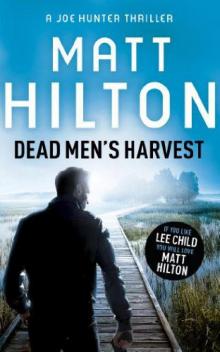 Dead Men's Harvest jh-6
Dead Men's Harvest jh-6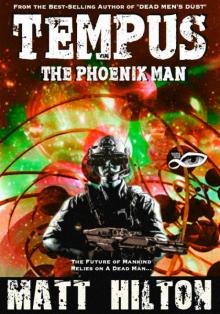 Tempus: The Phoenix Man
Tempus: The Phoenix Man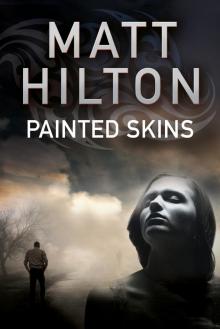 Painted Skins
Painted Skins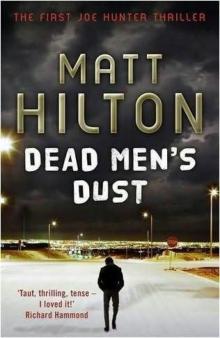 Dead Men's Dust jh-1
Dead Men's Dust jh-1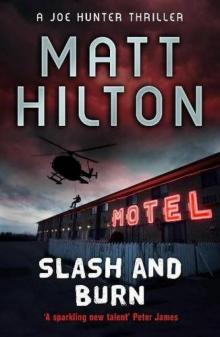 Slash and burn jh-3
Slash and burn jh-3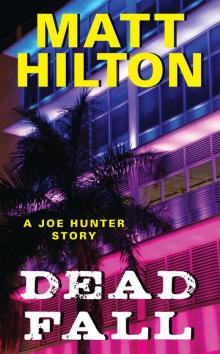 Dead Fall
Dead Fall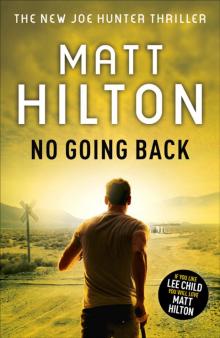 No Going Back - 07
No Going Back - 07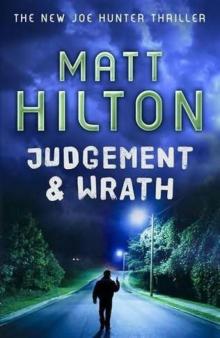 Judgement and Wrath jh-2
Judgement and Wrath jh-2